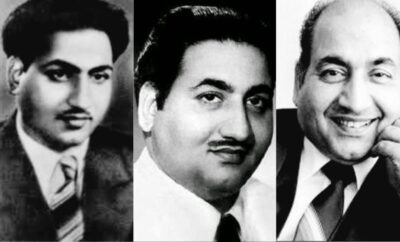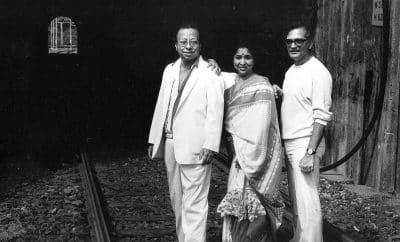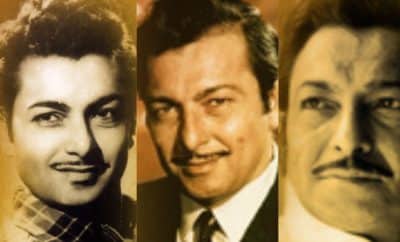Song Sketch
Suhani Raat Dhal Chuki – Dulari – The Slumberless Saga
The night perches on the earth through the gateway of the evening and spreads its dark wings all over. It brings along an altogether different world – the world of the moon and the stars, the world of slumber and dreams. While most of the populace gets between the sheets to recharge itself for a new day, the world of lovers, oblivious to the earthly affairs, becomes super-active at the unearthly hours. The ones in love aren’t able to sleep a wink as they are busy in love or lovely memories. On the other side, the lovelorn become night owls in the seemingly unending wait for the lover. The wait is long, and the night is fleeting; and like muffled drums, their hearts keep on beating.
If you are asked to choose one song describing this situation, which would it be? Most of us would surely choose this from Dulari (1949) –
The spooky and haunting prelude of the song starting with guitar strums and temple blocks, followed by trumpet sets the perfect tone of the song, and the hero wating for the heroine in the shambles of an abandoned site starts expressing the pang of his long wait –
Suhaani raat dhal chuki, na jaane tum kab aaoge?
Jahaan ki rut badal chuki, na jaane tum kab aaoge?
The pleasant night has slipped away. The weather has also changed. When would you come?
The brief pieces of flute between the lines of the refrain highlight the intensity of his feelings.
The interlude comprising guitar strums and temple blocks keeps up with the tone of the situation. The hero continues his expression with more agitation denoted by higher notes now –
Nazaaren apni mastiyaan dikha dikha ke so gaye,
Sitaaren apni roshni luta luta ke so gaye,
Har ek shamma jal chuki, na jaane tum kab aaoge?
The vistas, tired of showing their rapture, have fallen asleep. The stars, exhausted after glittering throughout the night, have gone to sleep. Every lamp has gone out in the wake of the dawn waiting at the horizon. When would you come?
We then hear a few distant notes of saxophone, and now the hero’s agitation seems to have culminated into choked throat. He continues with speaking his heart out –
Tadap rahe hain hum yahaan tumhaare intazar mein,
Khija ka rang aa chala hai Mausam-e-bahaar mein,
Hawa bhi rukh badal chuki, na jaane tum kab aaoge?
My suffering in your wait knows no end. Shades of autumn are creeping in the season of blossom. Even the winds have changed their course, indicating the shift of seasons. But you have not arrived, and I continue to wait endlessly!
The wonderful composition by Naushad, that sets Shakeel Badayuni’s words to the tune, haunts us end to end. Naushad, one of the composers who were instrumental in shaping up the Hindi film music starting the ’40s through the golden era, had his unique style of compositions based on folk and classical music, with the tunes mainly orchestrated with Indian musical instruments. The style of this composition and its orchestration is however quite different from his usual style.
Shakeel Badayuni, who was a prolific poet first and a lyricist then, has efficaciously described the pain of eternal wait through his words. This is one of the early songs of Naushad and Shakeel Badayuni together, who went on the have long-lived bountiful partnership thereafter.
Last but not the least, Mohammed Rafi’s poignant rendition is the soul of this soulful song. He was the man with a divine voice and golden heart – a master of singing and a thorough gentleman. The purity of his heart always reflected in his voice and hence, his voice always sounds divine and unadulterated. One of his early hits, this song announced the arrival of a playback singer with outstanding calibre and a fresh voice, who went on to become undisputed emperor of playback singing in Hindi cinema.
The song harbingered the numerous memorable classics that the trio was to create in the future and remains popular to date. The slumberless saga of unending wait that the song narrates, which is the essence of this song, would remain the same till love remains in this world, and hence the song continues to appeal even today, although 7 decades have elapsed.




Vikram Bapat
January 19, 2022 at 12:43 pm
Yogesh – Superb poetic translation of a romantic and poignant unforgettable composition!
Yogesh
January 19, 2022 at 1:40 pm
Thanks a lot, vikram!
Shamshad
January 19, 2022 at 4:08 pm
Best ✍ ?
Madhupati Sharma
January 20, 2022 at 1:17 pm
Rightly said each and every bit about this song. Apart from being forst superhit of Rafi it is only song in the night sung so powerfully portraying the absence of someone through passage of night slowly. One feels the environment, that is the power of this magical composition of Naushad with Shakeel Badayuni.I have listened it in different shades and voices. One is below ..the song environment imagined in modern ways..
https://youtu.be/NYAK05EAjzY
Pratik
July 18, 2024 at 10:19 am
Beautifully expressed. The songs plays in the heart as one goes through the lines written on paper. “The slumberless saga of unending wait…” is so beautiful !!!